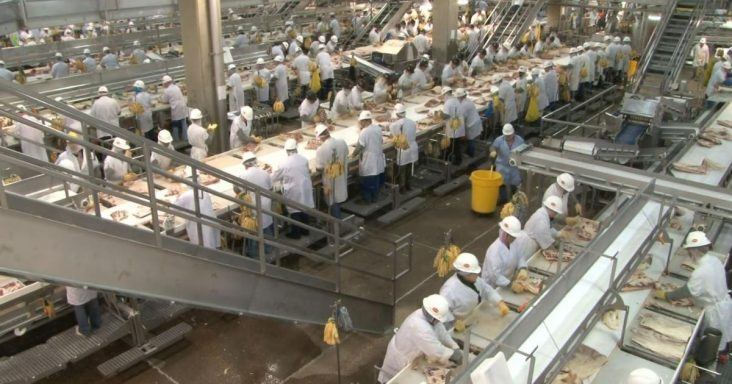Tyson Foods to invest $300 million in new beef plant in Salt Lake City
by May 10, 2019 9:19 am 4,688 views

Tyson Foods announced Friday (May 10) an expansion to its Fresh Meats division, with plans to build a $300 million plant in Salt Lake City, Utah, for case-ready meat. The company has similar facilities in Sherman, Texas, Council Bluffs, Iowa, and Goodlettsville, Tenn.
A case-ready plant is a meat-cutting, portioning and packing operation that simulates what goes on behind the traditional butcher shop at a much larger scale. Large cuts of beef and pork are cut up, packaged and sent directly to retailers like Walmart who put the items in the meat case.
Tyson Foods said the westward expansion will help the company better serve its customers in that part of the country. The plant is expected to employ up to 800 workers. That number will ramp up to 1,200 within the first three years of operation. Tyson Foods said there are still some details to work through but the facility is expected to come online as early as 2021.
“More than ever before, when it comes to the meat section retailers are looking for solutions and today’s shoppers are looking for convenience. We’ve seen a growing demand for consumer-ready meat, pre-packaged and available to pick up and go,” said Nate Hodne, senior vice president of Value Added and Case Ready Beef & Pork at Tyson Foods.
This new plant will help to support the growing demand, he added.
“We’re excited about building a new food plant in Utah and appreciate the state’s support and the exceptional people we’ve met,” Hodne said. “We believe Utah is a great location because of the availability of labor and property and the access to highways and rail. Once built, the new facility will help us meet the growing demand for case-ready meat in the western U.S.”
Within the first decade, the facility is expected to generate an estimated economic benefit of more than $1 billion through construction, salaries, sales taxes and other investments. The Utah Governor’s Office of Economic Development (GOED) said the new plant will also add an estimated $27 million in new state tax revenue over the next 10 years.
“We are pleased that Tyson Foods, a Fortune 100 Company, has selected Utah to build its newest facility,” Val Hale, executive director of GOED, said in a statement. “This well-known company has a long history and great reputation. It will allow them to have better distribution and access to the western states.”
Hale said Tyson Foods representatives have assessed several potential plant sites in the Salt Lake City area and are collaborating with local officials at one of the locations to confirm all needed infrastructure and other support will be available. Once the remaining questions are answered, more information will be shared.
Tyson Foods will scoop up plenty of tax incentives related to the new facility. Hale said state tax incentives for the project are based on 500 of the expected high-paying jobs. The total wages in aggregate for each position used to determine incentives must exceed 110% of the average county wage. Projected new state wages over the life of the agreement may be up to $202.63 million. Projected new state tax revenues, as a result of corporate, payroll and sales tax are estimated to be $27.79 million.
Tyson Fresh Meats may earn up to 20% of the new state taxes it will pay over the 10-year life of the agreement in the form of a post-performance Economic Development Finance (EDIF) tax credit rebate.
Hale said the GOED Board of Directors approved an EDIF post-performance tax credit not to exceed $5.25 million and a post-performance Industrial Assistance Fund economic opportunity for the last-mile infrastructure of $300,000, representing 20% of the estimated $27.79 million of new state revenue, which may be earned over 10 years. Each year Tyson Foods meets the criteria in its contract with the state, the company will earn a portion of the total tax credit rebate.
Tyson Foods is the largest meat packer in the U.S. with roughly 28% of the market share for beef and 10% of the market share in pork, behind Smithfield and Hormel. Beef continues to be big business for Tyson Foods. The segment comprised 37.8% of the company’s total revenue through the first half of the fiscal year, which started Oct. 1. The beef segment also comprised 32% of the company’s total operating income in the same period. Tyson Foods’ outlook for beef in the back half of the fiscal year is solid, projecting a 7% operating margin, one of the highest in the industry.
Tyson Foods shares (NYSE: TSN) dropped slightly in the early minutes of trading on Friday. Shares opened at $77.69, down 25 cents. For the past 52-weeks Tyson shares have traded between $78.15 and $49.77.
